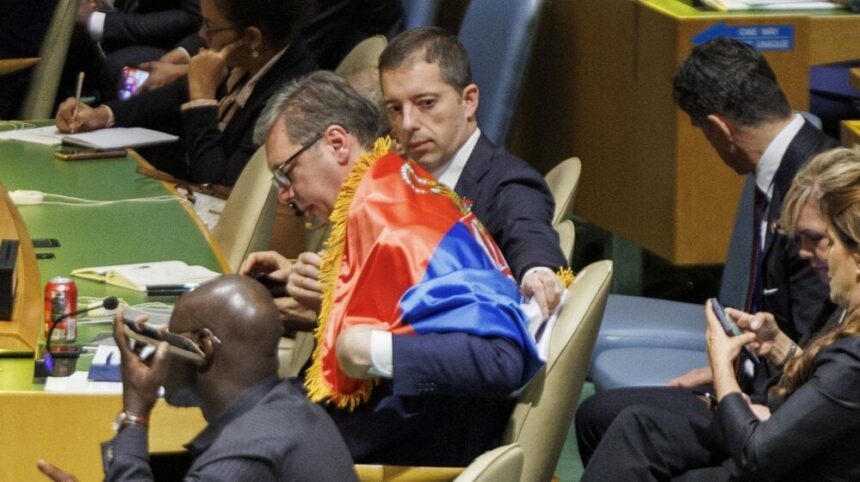Serbian President Aleksandar Vučić is preparing to attend the 80th UN General Assembly in New York from September 23–27, 2025, amid ongoing international scrutiny of Serbia’s foreign policy and its position on Kosovo. Experts warn that, despite high expectations from the Serbian government, the visit is unlikely to produce significant breakthroughs in international diplomacy, and is likely to serve primarily as a platform for domestic political messaging.
Strategic Challenges for Serbia
Serbia is currently navigating a complex geopolitical landscape:
- The country faces limited support among international allies and appears strategically adrift, making it difficult to respond effectively to pressing national issues.
- Major challenges include the deteriorating position of Serbs in Kosovo, ongoing U.S. sanctions on Serbia’s NIS energy company, and the unresolved political situation in Republika Srpska.
- Analysts, including former ambassador Duško Lopandić, note that Vučić’s previous appearances at the UN leaned heavily on symbolic gestures, such as wrapping himself in the Serbian flag, which many viewed as pseudo-patriotic theatrics rather than substantive diplomacy.
Despite this, there is cautious optimism that this year’s UN visit will be more diplomatically focused, avoiding overtly theatrical displays while pursuing concrete bilateral and multilateral engagements.
Main Objectives of Vučić’s Visit
Vučić’s itinerary includes a series of high-profile meetings with U.S. officials, notably:
- Secretary of State Mark Rubio
- Treasury Secretary Scott Besent, with discussions expected to focus on sanctions against NIS and other economic measures.
Key themes for Serbia’s engagement at the UN include:
- Kosovo: Maintaining Serbia’s claims of sovereignty and opposing Kosovo’s potential UN membership.
- Community of Serbian Municipalities (ZSO): Seeking international backing for the establishment of the ZSO in Kosovo, a longstanding priority that has yet to be fully implemented.
- Normalizing Relations: Promoting dialogue between Belgrade and Pristina as part of broader diplomatic efforts, while simultaneously seeking to prevent Kosovo’s UN accession.
- Multilateral Engagement: Leveraging side meetings at the UN to lobby countries with potential influence over Kosovo’s recognition and the broader Balkan agenda.
Expert Analysis
Mijat Kostić, researcher at Novo Treći Put, emphasizes that Serbia may exploit recent tensions between the U.S. and Kosovo’s leadership to gain broader international support, though he cautions that expecting countries to withdraw recognition of Kosovo is unrealistic. Instead, the current environment creates space for Serbia to push for support on initiatives like the ZSO formation, potentially with backing from major powers such as the U.S., Russia, and China.
Mihajlo Brkić, former ambassador, stresses that Vučić’s presence at the UN is important if Serbia aims to defend its legal and territorial claims over Kosovo, particularly reaffirming the relevance of UN Security Council Resolution 1244. He highlights the opportunity to engage in bilateral and multilateral diplomacy during the General Assembly, rather than relying solely on the main podium for speeches.
Duško Lopandić highlights Serbia’s international isolation, noting that Vučić’s alignment with Israel to attract U.S. attention has produced minimal tangible results. He stresses that Serbia’s foreign policy is currently characterized by strategic confusion, with the government seeking support from Moscow, Beijing, and Washington, often in a fragmented and reactive manner.
Milovan Božinović, former ambassador, underscores the limited effectiveness of the UN General Assembly in resolving long-standing conflicts due to structural constraints, including veto powers within the Security Council. Nonetheless, he points out that bilateral encounters at the margins of the Assembly can yield practical benefits, allowing Serbia to advance specific national interests incrementally.
Nebojša Vujović, another former diplomat, raises the possibility that Vučić could face critical questioning from international officials regarding prior intelligence and security issues, including unresolved matters linked to espionage or other controversial incidents. While ceremonial meetings are likely, substantive scrutiny is expected in bilateral sessions.
Broader Context
Serbia’s diplomatic position has been weakened in Europe, and Vučić faces the challenge of maintaining credibility both regionally and globally. The erosion of multilateralism and the increasingly assertive roles of major powers complicate Serbia’s ability to assert influence in international forums. Analysts note that Serbia’s past diplomatic missteps and internal political crises have further diminished its standing.
While the General Assembly is unlikely to deliver significant changes regarding Kosovo or Serbia’s broader foreign policy goals, it remains a crucial platform for:
- Meeting influential diplomats and foreign ministers from other UN member states
- Advancing Serbia’s positions in subtle, behind-the-scenes negotiations
- Reinforcing Serbia’s legal claims and international messaging on Kosovo
Vučić’s upcoming UN visit is therefore a complex mix of domestic signaling and strategic diplomacy. While expectations for major breakthroughs are low, Serbia may achieve incremental progress through bilateral engagements and lobbying efforts. Experts agree that avoiding theatrical nationalism and focusing on concrete diplomatic initiatives will determine the visit’s overall effectiveness.







